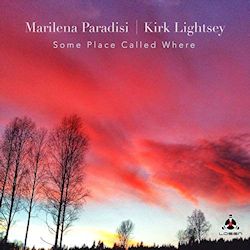 BUY NOW AmazonUK AmazonUS |
MARILENA PARADISI AND KIRK LIGHTSEY Some Place Called Where
|
MARILENA PARADISI AND KIRK LIGHTSEY
Some Place Called Where
LOSEN RECORDS LOS 187-2 [45:00]
Portrait
Some Other Time
Like a Lover
Soul Eyes
Little Waltz
Some Place Called Where
Autumn Nocturne
Fresh Air
Recorded May 2017, Studio Extra Beat, Rome
However conventional it may to describe Kirk Lightsey as one of the most outstanding pianists still before the public it’s no less than the truth. His long lineage has equipped him with tremendous sensitivity to harmonic patterns and his accompaniments, whether for Chet Baker or for Dexter Gordon, were invariably of great distinction. In this album he accompanies Italian singer Marilena Paradisi in her first English-language venture on disc in a 45-minute session recorded in Rome in May 2017. It’s a delight.
Only one of the songs is a Lightsey original, Fresh Air, which has lyrics by Paradisi herself; the remaining tracks include a panoply of well-loved standards from the likes of Leonard Bernstein, Mal Waldron, Charles Mingus, Wayne Shorter and others. The opener, Mingus’ Portrait reveals the levels of subtlety involved in this album, led principally by Lightsey’s deft harmonic hints and his suggestive and never explicit support for Paradisi’s excellent vocals. Some Other Time is buoyant and witty though never overdone; stylistic bounds are secure. Tonally Lightsey is at something like his most resplendent in Like a Lover where one also finds real buoyancy of rhythm and a vocal that shows conversational ease even in the Latino vocalese.
Mal Waldron’s Soul Eyes draws a darker, more mezzo-based tone from her – almost sultry here – and Lightsey similarly draws on classical allusions in his accompaniment. Cleverly insinuating vocalese into the Little Waltz highlights one of her strengths and though it’s a procedure I don’t like, I can say that she does it well. Occasionally, though, I felt that the register in Shorter’s Some Place Called Where pushed her a little too high for comfort but it’s a clever arrangement and the playing is full of stylish character. The stage is incarnated in the Myrow-Gannon Autumn Nocturne and Lightsey’s hints of the blues are balanced by a touchingly fugitive sense of tristesse. For the final track, Fresh Air, Lightsey is overdubbed playing flute and it makes an intriguing finale to what is an assured, articulate, poised and pleasurable encounter between the veteran American pianist and the Italian singer.
Jonathan Woolf